Oct 5, 2025. Visit to Annabel’s Meditation Center, Jungto Dharma School Q&A
Hello. Following last week, starting today for the next three days, Sunim will be meeting with members of the U.S. Congress, government officials, and think tank representatives in Washington D.C. to discuss peace on the Korean Peninsula.
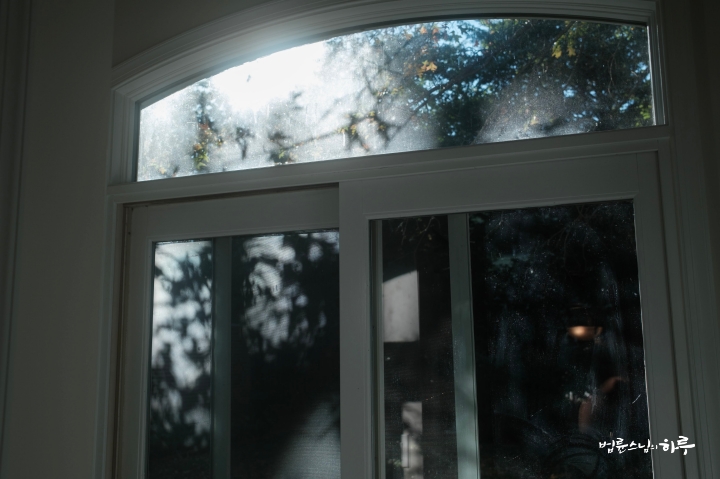
Sunim began his day at 5 AM with practice and meditation at the Washington DC Jungto Center. After breakfast, he departed at 7 AM for Annabel Park’s meditation center in West Virginia.
Annabel Park is a Korean American documentary filmmaker and civic activist. She has played a crucial role in raising awareness about comfort women issues and Korean human rights concerns to the U.S. Congress and local communities, serving as the national coordinator of the ‘121 Coalition’ and leading the passage of ‘House Resolution 121 (H.Res.121)’. House Resolution 121 (H.Res.121) is a resolution unanimously passed by the U.S. House of Representatives on July 30, 2007, calling on the Japanese government to formally apologize and acknowledge historical responsibility for the ‘comfort women’ system perpetrated by the Japanese military during World War II. This resolution was initiated by the Korean American community and civic organizations, with Representative Mike Honda as the primary sponsor. While not legally binding, it is considered a symbolic measure expressing the official position of the U.S. Congress on human rights and historical justice issues. It subsequently became an important catalyst for spreading the issue of Japanese military comfort women to the international community’s agenda.
When Sunim met Annabel Park in Washington D.C. last time, he received an invitation to visit her meditation center. He made time to visit today.
Passing through Harpers Ferry and crossing the Appalachian Mountains, they headed to Lost City. After a three-hour journey, they arrived at Annabel Park’s meditation center at 10 AM. Annabel Park was waiting at the entrance. The two exchanged warm greetings. Since today was Chuseok, a Korean holiday, Sunim brought Korean pears and yugwa (traditional Korean confection) as gifts.
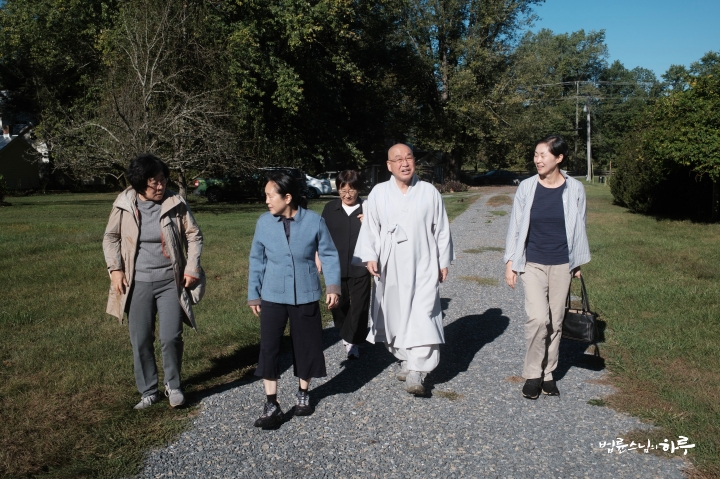
“People are meditating in the meditation room right now. They’ll finish in 20 minutes, so shall we take a tour around?”
Annabel Park personally guided them around the meditation center.
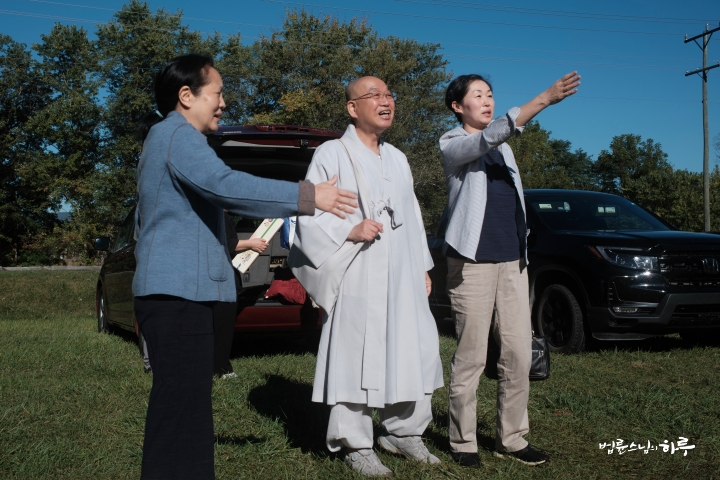
After touring the farm, they went inside the house to have tea and conversation. Sunim gave Annabel Park the English translation of his book “Happiness” and a phone holder brought from Korea as gifts.
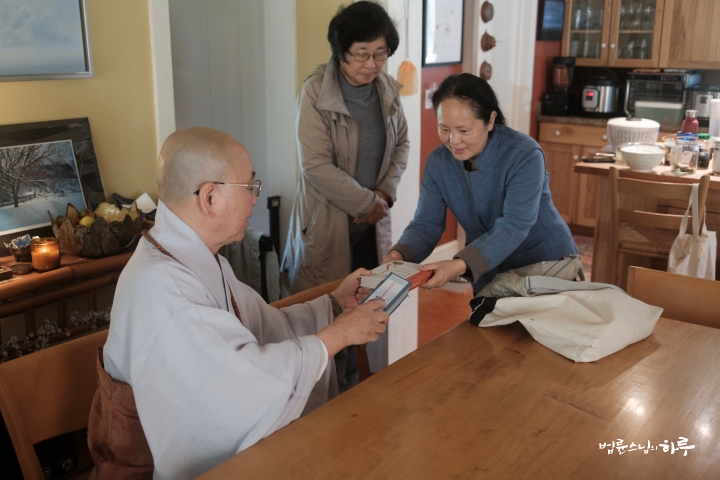
They then exchanged greetings with people who had finished their meditation. These practitioners meditate every Sunday morning and were very pleased to hear about Sunim’s visit. After introductions, they had a Dharma Q&A session with Sunim about their questions.
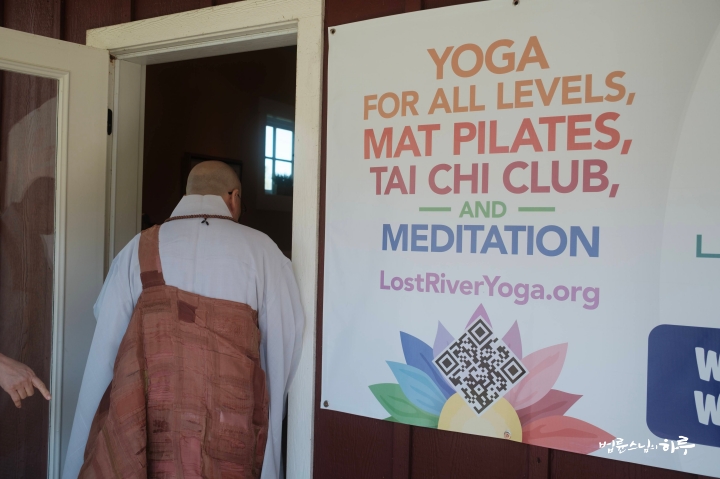
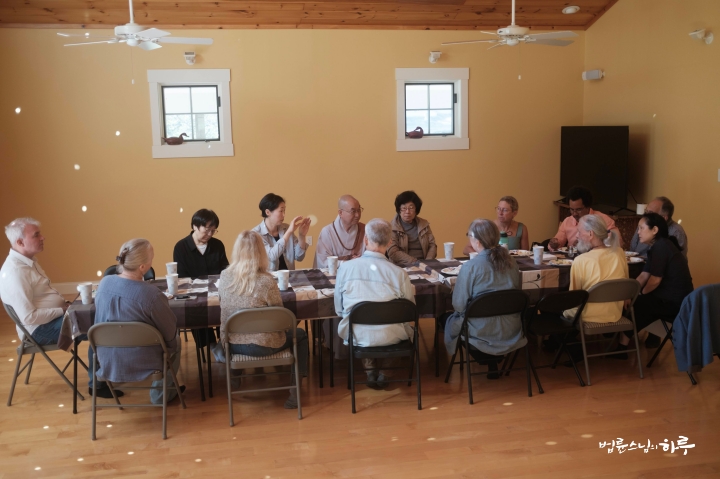
Various questions continued for an hour. The first questioner sought Sunim’s advice on how to maintain peace of mind amid the chaotic situations occurring everywhere since President Trump took office.
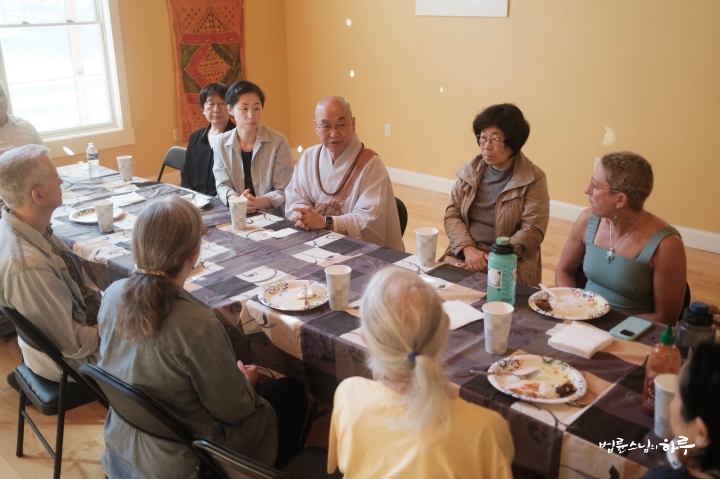
When the World Is in Chaos, How Can We Maintain Peace of Mind?
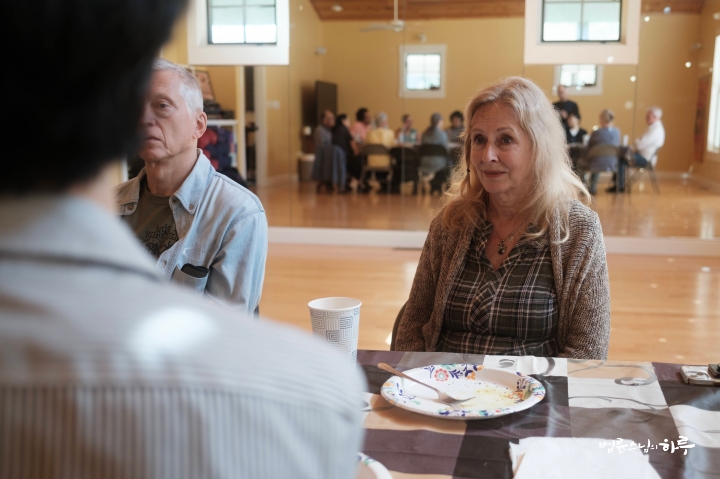
“There has been chaos in every era throughout history. We must maintain peace of mind regardless of external circumstances. If we are swayed or influenced by chaotic external environments, our minds become disturbed. Therefore, it’s important to first maintain peace of mind in any situation. This doesn’t mean we should ignore the problems of the outside world. We should participate in making the world peaceful while maintaining our inner peace. Without peace of mind, anger easily arises in the process. That’s why you must first maintain peace of mind regardless of what’s happening in the outside world.
People have different beliefs, ideologies, and thoughts. We must acknowledge these ‘differences.’ It’s not that I am right and others are wrong; we are simply different. Within these differences, I simply make my own choices. For example, when there are Christianity and Buddhism, neither is right or wrong; they are just different, and I choose Buddhism.
It’s also necessary to understand that from the other person’s perspective, they may think or believe that way. When you understand others, anger doesn’t arise in your mind. ‘Understanding’ doesn’t mean their viewpoint is correct, but rather ‘from their position, they might think that way.’ Of course, I may not think the same way. Therefore, it’s important to continue dialogue while acknowledging our differences.
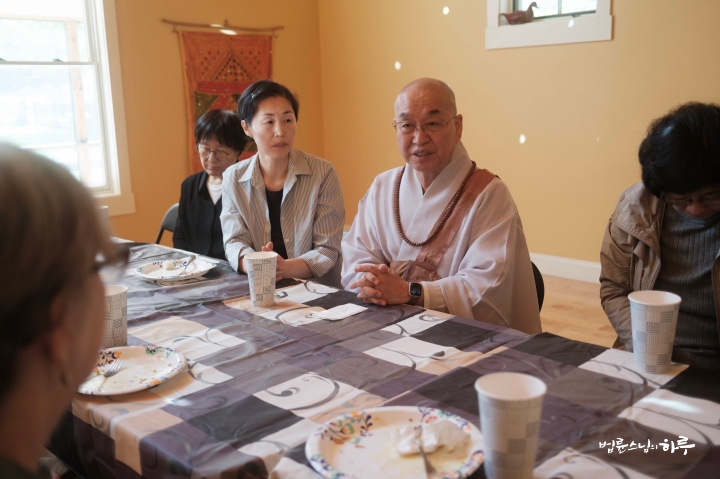
In today’s world, the perspective of “I am right and the other is wrong” has become excessively strong, intensifying conflicts and even leading to a tendency to demonize others. In extreme cases, this leads to the radical thinking that “it’s okay to kill them,” ultimately resulting in war. Therefore, it is most important to first maintain peace in one’s own mind. Additionally, we need an attitude that recognizes our differences and tries to understand, thinking “From their perspective, that could make sense.” Only with such an attitude can we resolve problems peacefully.
Thich Nhat Hanh did not remain silent even in more difficult circumstances than today, actively working to end war and achieve peace. Yet he did not resent the communists or French colonial rulers. He resisted their actions simply because they caused suffering to people. Today, American society is operating in different ways than before due to various issues. If other countries respond in the same manner as the United States, conflicts could escalate, so we need to respond while thoroughly examining why these phenomena are occurring.
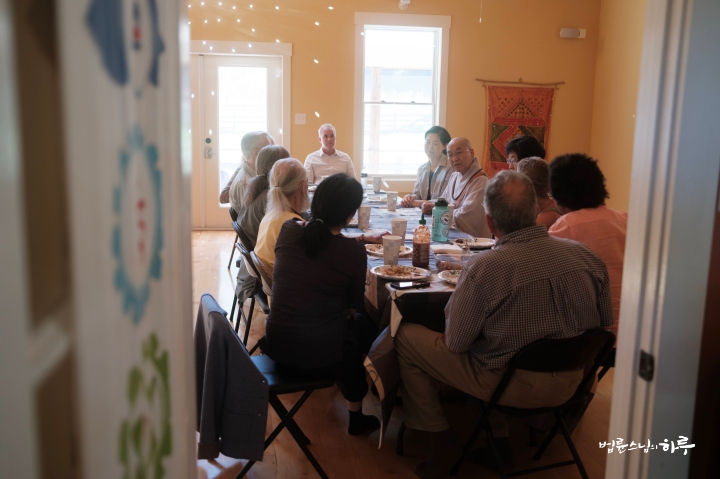
In my view, the widening wealth gap seems to be the root cause of these problems, both globally and within the United States. The gap between rich and poor countries continues to grow, and within each country, the divide between the wealthy and the poor is expanding daily. Poor people in poor countries find it difficult to make a living in their own countries and have no choice but to migrate to other countries. However, low-income people in wealthy countries are also finding life increasingly difficult. In this situation, when immigrants arrive, they feel their lives have become harder and develop exclusionary attitudes toward immigrants. Some politicians exploit these grievances and fears, scapegoating immigrants as the cause of problems and inciting anti-immigration sentiment.
This phenomenon is occurring not only in the United States but also in many other European countries. It’s difficult for anyone to predict how this issue will unfold. We don’t know whether this phenomenon will continue to expand or whether new solutions will emerge. However, what we must do is find ways to minimize the suffering people experience in this process. Perhaps the work you are doing now is one of those starting points.”
“Thank you.”
Everyone expressed their gratitude to Sunim for coming such a long way, and they took a group photo together.
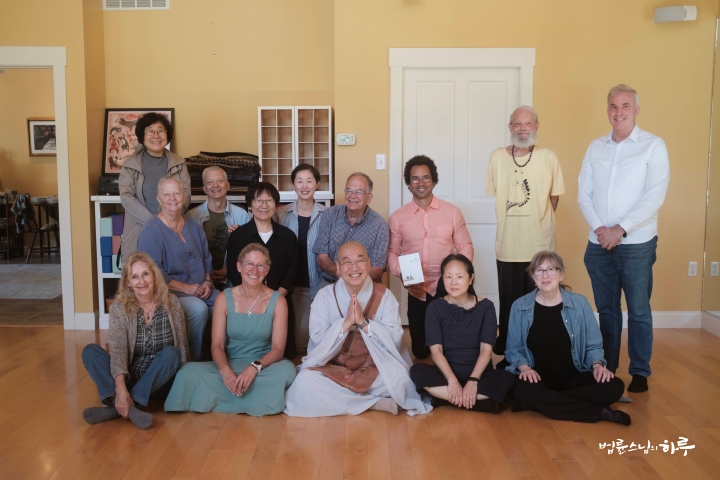
Sunim gave each participant a copy of the English translation of “Letters of Hope” as a gift.
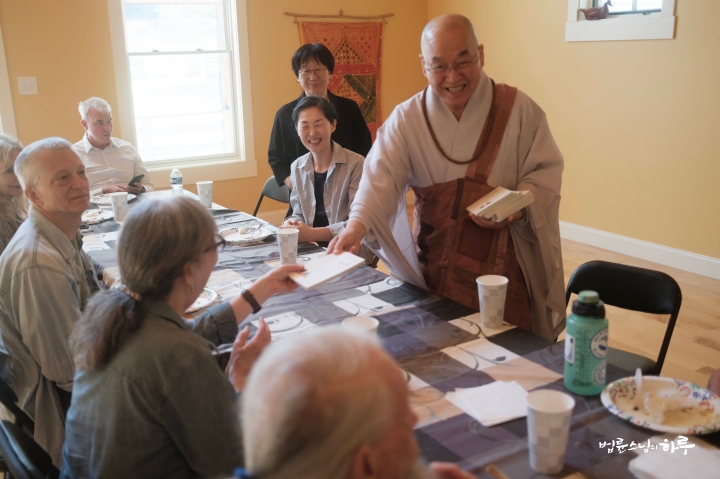
Sunim also warmly greeted Reverend Richard Tafel, with whom he had held several dialogues. Reverend Tafel mentioned that he plans to visit Korea next year with Annabel Park and said he would visit Sunim then. Sunim also encouraged him to visit the Jungto Social and Cultural Center in Seoul.
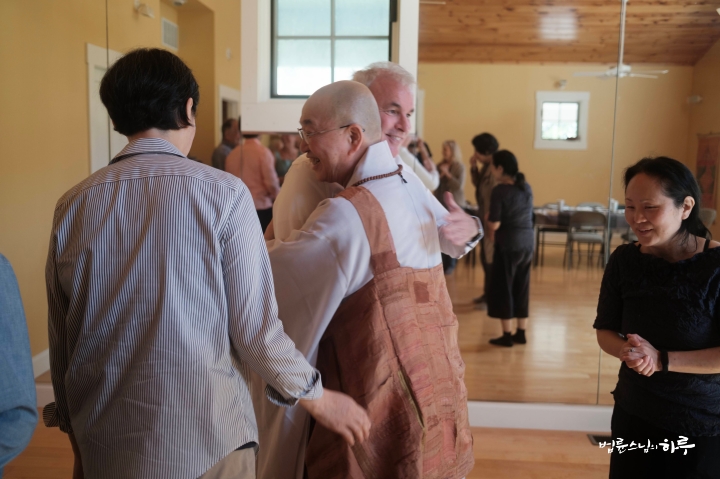
After saying farewell, they departed West Virginia at 12:10 PM and headed to Tysons Corner, Virginia. After traveling for 2 hours and 10 minutes, they arrived at the location where they had arranged to meet Dr. Jae H. Ku.

Dr. Jae H. Ku currently serves as a Senior Fellow for U.S.-Korea Relations at the Center for the National Interest, a foreign policy and national security think tank in Washington, D.C., where he works as an expert on U.S.-Korea relations and East Asian human rights and foreign policy. He was the founder and director of the U.S.-Korea Institute at Johns Hopkins School of Advanced International Studies (SAIS) and previously served as the director of the North Korea human rights project at Freedom House. He has been actively writing and making policy recommendations on diplomatic relations with Korea, China, and Japan, North Korean human rights and democracy, and U.S.-Korea alliance strategy.
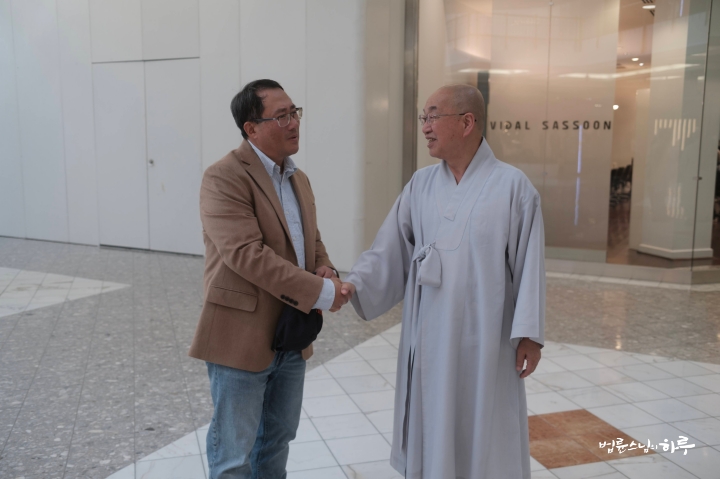
During his tenure at Johns Hopkins University, he had invited Venerable Pomnyun Sunim as a panelist to Korea-related events several times and had several personal meetings with him. They were meeting again after a very long time. The two warmly greeted each other and had an in-depth conversation for an hour and a half on topics including the current situation in the United States, U.S.-North Korea relations, U.S.-Korea relations, and human rights issues. Since today was Korean Chuseok holiday, Sunim gave Dr. Ku Korean pears and yugwa (traditional Korean confection) as gifts.
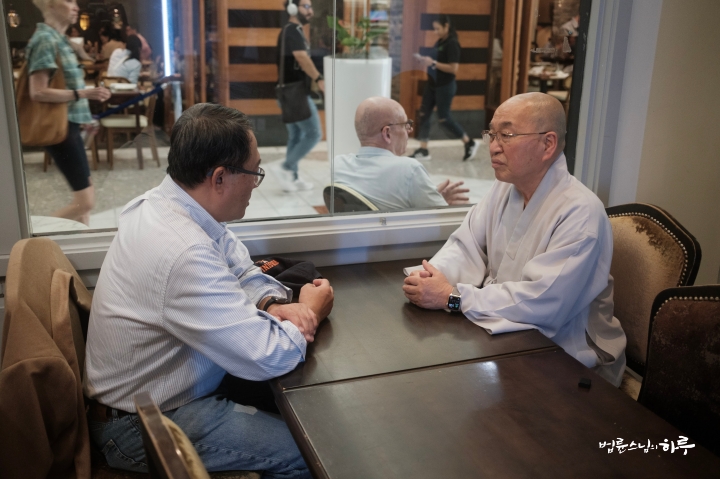
After the pleasant meeting, on the way back to the U.S. Jungto Center, they briefly stopped by Jacob’s house as it was nearby. Sunim also gave Jacob pears and yugwa as Chuseok gifts for his family to enjoy together. Jacob’s family is expecting a baby soon, and his wife had prepared a simple meal of kimbap, cookies, and fruit, so they briefly exchanged greetings with the family.
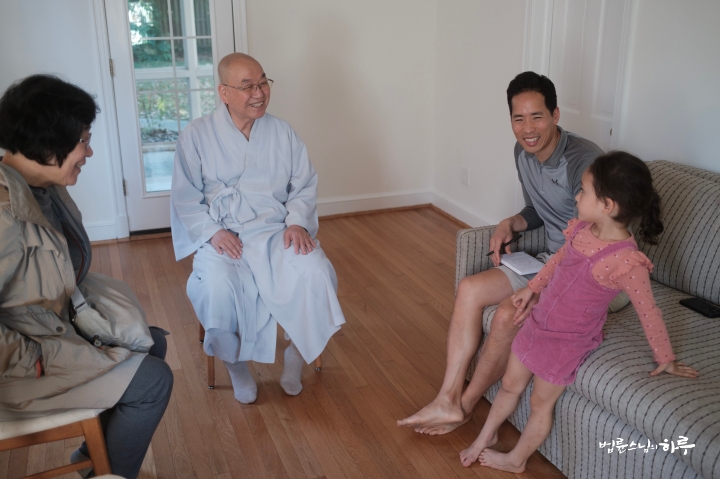
After completing all external schedules and returning to the U.S. Jungto Center, it was 5:40 PM. Sunim took a brief rest until the next schedule.
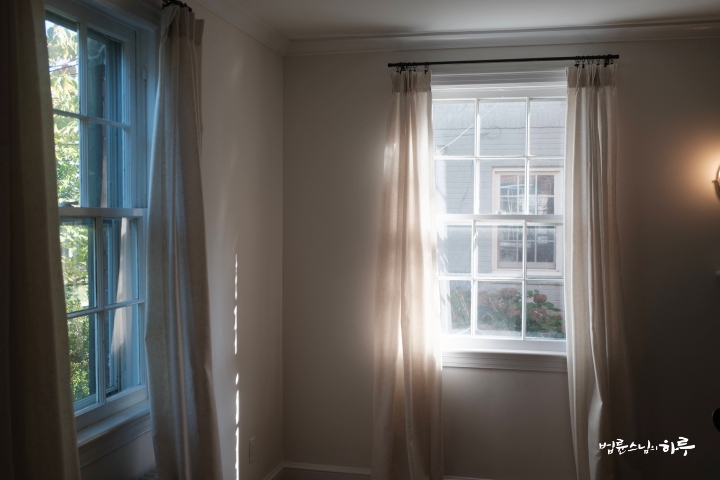
After sunset, from 7 PM, Sunim held a Dharma Q&A session with students enrolled in Jungto Dharma School who were studying the “Human Buddha” course. Once all the students had entered the online video conference room, Sunim gave his opening remarks. He began the dialogue by discussing why we need to study the Buddha’s life, especially in these chaotic times.
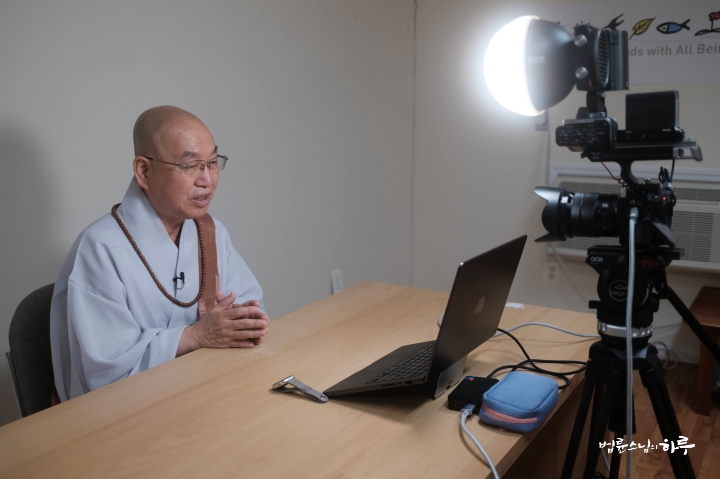
“Today is Chuseok, a Korean holiday. It’s the day when the full moon rises. On this day, we have a tradition of preparing various foods with the new grains and fresh fruits we’ve harvested throughout the year and offering them to our ancestors in a memorial ceremony.
I’m not in Korea right now but in Washington, D.C. I’ve met with Korean people living here and American college students for Dharma talks. I’ve also met with U.S. State Department officials and think tank members to discuss peace on the Korean Peninsula. When I arrived in America, I found that due to differences in views between the Republican and Democratic parties, the government budget hasn’t been passed, resulting in a shutdown where government employees can’t come to work. It’s not just America – in Korea too, there are severe conflicts between the ruling and opposition parties due to political differences. Even with different views, they should cooperate to lead the country, but by only asserting their own party’s claims, conflicts intensify and actually endanger the nation.
In Myanmar’s case, conflicts have developed into civil war, causing great suffering for many citizens. That’s why JTS is supporting Myanmar refugees who are crossing into neighboring countries like Thailand and Bangladesh. When I visited the field, I could see that the extent of destruction and people’s suffering was very severe. If political leaders could directly see the suffering that citizens endure, they might be able to find a path to compromise even with different views, but they seem unaware of how many people are suffering due to their dogmatic belief that only their claims are right. Perhaps they value their own assertions more than the suffering of their citizens.
A Story of Practicing Peace in a Chaotic World: The Life of the Buddha
The Buddha taught that we must acknowledge that each person has different thoughts, beliefs, views, and claims. When we base our interactions on recognition and understanding – acknowledging our differences and understanding that from their perspective, they could think that way – we can achieve dialogue, compromise, and peace. In today’s society with such severe conflicts, the Buddha’s teachings seem even more necessary. Many of the Buddha’s teachings were not given in peaceful times. He lived in a society where confrontation, conflict, and war were commonplace, where many people were suffering, and he taught people the wisdom he had awakened to.
Regardless of circumstances, we must find peace of mind for ourselves. While maintaining equanimity in our own minds, we must not turn away from the world’s many problems but work to eliminate people’s suffering.
The Buddha’s life shows how a human being can maintain peace of mind in a chaotic society and live for world peace. The Buddha actually lived amid various problems that are occurring in today’s world, listening to and working together to solve the suffering of his contemporaries. By learning about the Buddha’s life, we can understand practical Buddhist history and Buddhism’s social nature. Today, let’s have a dialogue about various questions that arise as you study the Buddha’s life.”
He then took questions about things students were curious about while attending Jungto Dharma School classes. For 1 hour and 50 minutes, four people asked Sunim questions and had conversations with him. One of them sought Sunim’s advice, saying that the harder they work, the better their results, but loneliness accumulates in a corner of their heart.
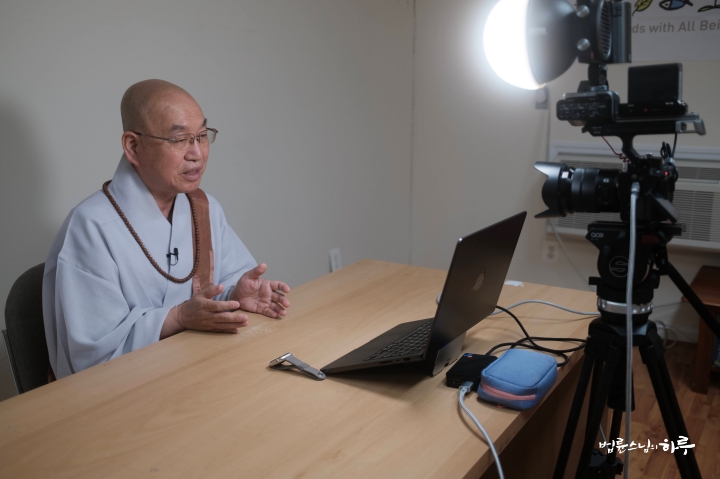
The More I Push Forward, the Lonelier I Become. Should I Take a Different Path Now?
“I’m now seventy-two years old. When I see young people running fast, I want to run fast too. One day, I watch an Olympic athlete run 100 meters in 10 seconds on television. So I think I should also run 100 meters in 10 seconds. I practice hard every day but can’t achieve my goal. ‘Do I lack basic qualities?’, ‘Did I fail because of my age?’ – thinking many such thoughts leads to frustration. But when I think carefully, this was me being too greedy. There’s nothing wrong with wanting to run fast. But to run fast, I must first check my current condition. If I run 100 meters and it takes 25 seconds, this is my current starting point. If I set my first goal at 23 seconds from my current state and practice for three months, the probability of achieving the goal is high. Of course, I might fail, but the possibility is high. Once this goal is achieved, I can set a second goal. This time I set it at 20 seconds and practice for another three months but don’t achieve it. ‘Was my practice insufficient?’, ‘Was the goal too high?’ – I examine myself, adjust the goal to 22 seconds, and practice again. Then I finally reach 22 seconds.
This is how we must continue steadily. Our current state is the starting point where our two feet stand. We must look far ahead at our goal with our eyes while moving forward step by step. If we become too attached to the goal, our feet leave the ground and float in the air. We have ideals but deny reality, so we lack practicality and it becomes mere fantasy. Conversely, if our feet are on the ground but our eyes are closed, there’s no progress. So we must look at both together. We must stand firmly in our current reality while looking with our eyes at where we want to go, moving forward one step at a time. Then we can progress realistically. How about looking at it from this perspective? In the Buddha’s teaching, consistency is very important.”
Is There a Way to Let Go Without Giving Up?
“Nothing is absolutely fixed as ‘must be done this way.’ Let me use eating food as an example. We usually eat food without thinking, but actually the purpose of eating is to keep our body healthy. However, in reality, because we become attached to taste, we sometimes eat foods that harm our health. We think we shouldn’t eat them, but we eat them again, and then become disappointed in ourselves. At this time, we need a question to examine ourselves: ‘Why do I eat this food?’ First, to survive, and second, to be healthy. Third, it would be better if the food tastes good. However, if we become excessively attached to taste, overeat, harm our health, or even risk our lives, we must let go of our attachment to taste. It’s not that we must unconditionally let go of the desire to eat food. I’m saying that if that desire manifests as excessive behavior that harms our health and even leads us to death, we must be able to let go of the attachment. I’m not saying don’t taste. Feel the taste, but if that attachment harms you, you must let it go.
Letting go doesn’t mean giving up the goal itself, but giving up and releasing what is wrong. If you continue despite knowing it’s harmful, you’re harming yourself. We call such people foolish. A wise person is one who chooses a path that doesn’t harm themselves. That’s why the Buddha told us not to live foolishly but wisely. Therefore, if it’s the kind of attachment that harms yourself or others, you must let it go. If you have additional questions, please ask.”
“I’m grateful for the response to everybody from Sunim because it gave me another perspective. I liked the idea of taking smaller steps while being grounded in current reality and still looking to the future. In the past, I had sort of thought of giving up versus pursuing. That was I just looked at things only from a future perspective and was not grounded in the current reality, which has left me feeling lonely. So I am grateful for that perspective. Regarding the response to the second part of my question, I liked the analogy about why we eat food which is not good for our health. It led me back to one of Sunim’s talks where you mentioned that decisions have consequences, and that sometimes we don’t make decisions because we are afraid to take responsibility for those consequences. Today’s talk has helped me to look at things from a different perspective and realize that one of the reasons I’m not letting go is perhaps because I’m afraid of what I could be if I let go of my traumas or fears. Thank you for that perspective.”
Questions continued to follow.
I learned that meditation is about focusing on the present moment, but why do classes ask us to recall past emotions and memories?
How did the severe social inequality in Buddha’s time come about? How could a small upper caste dominate the majority?
How can we reconcile research showing that social relationships are important for happiness and health with Buddhism’s teaching that ‘the source of all suffering is within me’?
After answering all the questions, it was 8:30 PM. They agreed to have another dialogue session in the future and ended the live broadcast.
“I hope you all continue studying, and if you have questions, let’s meet again for dialogue. I wish you all a happy Korean Chuseok holiday.”
After having a late dinner at 9 PM, they discussed tomorrow’s meeting schedule and concluded today’s activities at 10 PM.
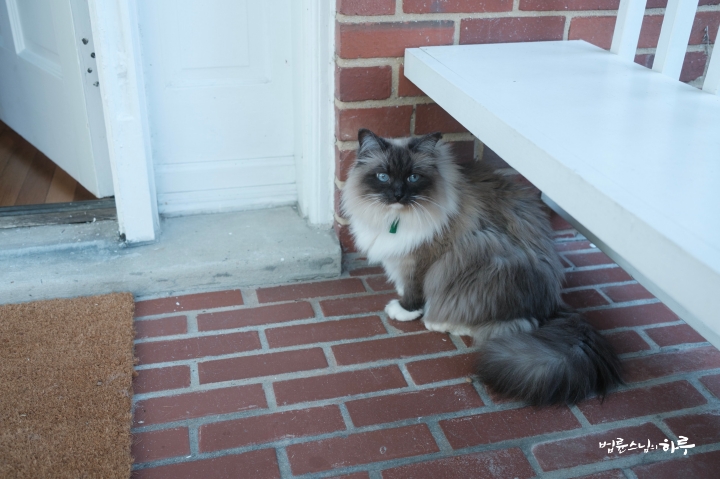
Tomorrow, Sunim will meet with Dr. Oh Mi-yeon, Korea Policy Chair at RAND Corporation, and then visit the U.S. Department of Defense for further meetings.





